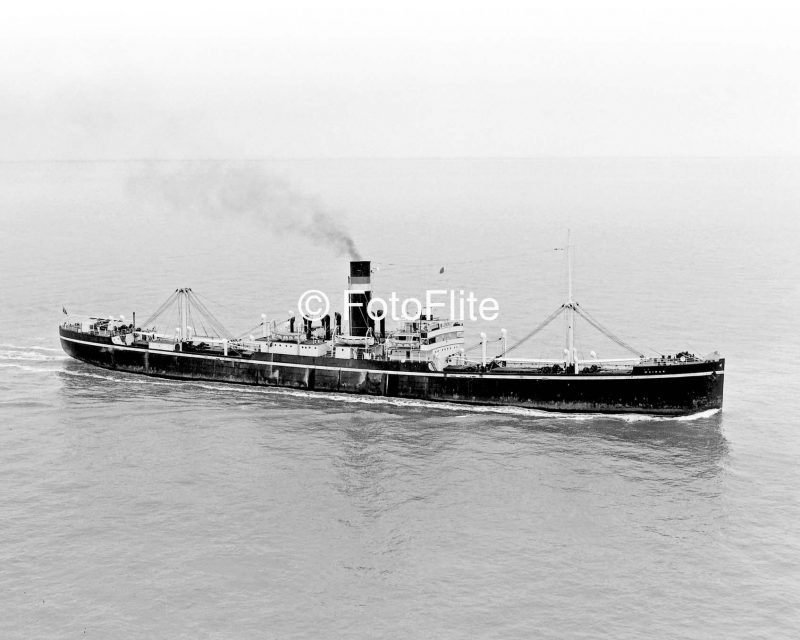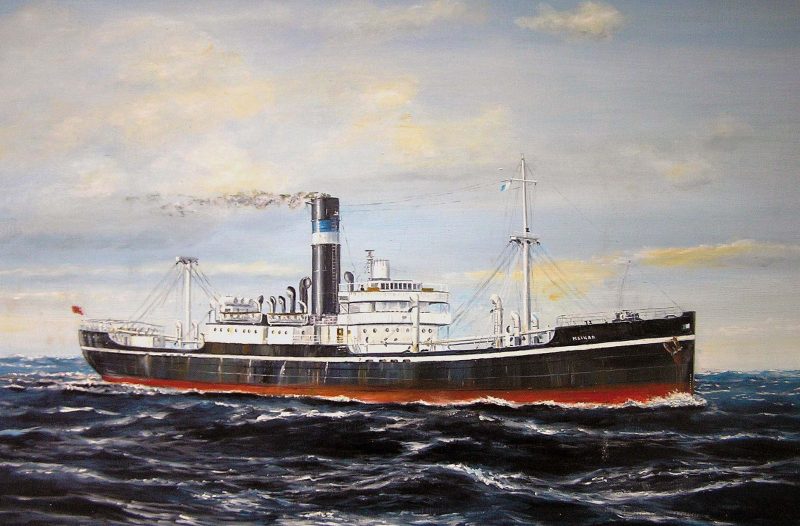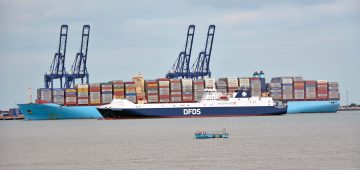by Jim Pottinger
To India on SS Maihar (part two)

 Five days out of London we called at the Moroccan port of Ceuta for oil fuel bunkers. As I was nominally responsible for filling the tanks I did not see anything of the port apart from the dock environs. The ship did not have any phone connections to the bunkering stations on deck but had a voice pipe in the boiler room to the deck. This rather antiquated arrangement made bunkering a somewhat fraught operation as when the oil was reaching the top of the sounding pipes in the after tanks it was necessary to sprint up the tunnel and shout to the man on duty at the voice pipe to give the signal to the shore to stop pumping. Many was the time that the valve cock on top of the sounding pipe had to be closed in a hurry without having time to pull up the steel measuring tape.
Five days out of London we called at the Moroccan port of Ceuta for oil fuel bunkers. As I was nominally responsible for filling the tanks I did not see anything of the port apart from the dock environs. The ship did not have any phone connections to the bunkering stations on deck but had a voice pipe in the boiler room to the deck. This rather antiquated arrangement made bunkering a somewhat fraught operation as when the oil was reaching the top of the sounding pipes in the after tanks it was necessary to sprint up the tunnel and shout to the man on duty at the voice pipe to give the signal to the shore to stop pumping. Many was the time that the valve cock on top of the sounding pipe had to be closed in a hurry without having time to pull up the steel measuring tape.
Our steady progress through the Mediterranean was only interrupted once when, on my watch, I detected some nuts on the air pump actuating lever slackening off. The emergency stop was a short one and we were soon away again. I was fast gaining the reputation of either a Jonah or being exceptionally vigilant!
At this stage of the passage east it became necessary to adjust the clocks for the time difference. On some ships this was done an hour at the time but we knocked a half hour off the 3rd and 4th engineer’s watches, this meant that the 2nd did not enjoy the shorter watches eastbound, but conversely did not have any additional time added to his watch homeward bound.
We arrived at Port Said at 2130 on the 2nd of July twelve days out of London and anchored among a large number of ships waiting to join the southbound convoy through the Canal before getting underway at 0340. This was before the passing ship canal was built and ships travelling in both direction in convoys passed each other in the wider waters of the Bitter Lakes.
For many this was the first glimpse of the mystic East, even the smell coming off the land was different.
We did not have a permanent searchlight in the bows so we used an old fashioned carbon-arc light slung over the bow and positioned so it illuminated the navigational markers and the adjacent bank. The canal passage took until 2100 hours next day and four days after clearing Suez at the southern end we arrived at Massawa, a port in northern Ethiopia and anchored until next morning when we went alongside.
I can truthfully say that this was the most uncomfortable port I have ever had the misfortune to enter. The heat was oppressive, exacerbated by the enclosed harbour, so much so that most of us slept on deck with spells in the vegetable handling room to cool off. Luckily we stayed only until next afternoon when we sailed on the short passage down to Assab.
This was a complete change from Massawa. We moored at a stone pier in a more or less open roadstead with a strong breeze blowing onshore to keep us cool. The port was pretty basic and the highlight was to watch the changing of the uniformed armed guard in front of an imposing white building above the harbour.
It was here that the Fifth’s goldfish finally expired. He had bought them at a market in East Ham and had carefully nurtured them this far. In rough weather anyone passing his cabin always checked that the bowl was securely wedged and that the water had not washed out. We put the cause of death to possibility of contamination in the sand he had picked off the beach to replenish the bowl.
After three days in the port we got underway for Djibouti, a short hop of twelve hours steaming down the same coast but now out in the Gulf of Aden. The ease of departure was confirmed by only taking forty five minutes from stand by to full away. Djibouti was almost equally uncomfortable as Massawa had been but we were only there Saturday overnight.

Next stop was Aden itself, a main bunkering and stop off point for many ships trading to the near and Far East and Australia.
All cargo working and bunkering was done from anchorages, usually necessitating a number of ship movements. After taking on fuel and water we unloaded some cargo into wooden barges. This did not deter the bum boatmen who soon took up position alongside to display their large range of wares, the duty free electrical and camera goods being an especial attraction. They could readily assume the dialect of any prospective customer, broad Scots, Scouse or Cockney was no trouble to them.
It was quite usual for us to give one of our Asian crew members the money to bargain on our behalf as they could usually drive down the price better than we could. One of our donkeymen in fact was an inveterate gambler, and used to clean up at the greyhound racing when we were in any UK port.
We left Aden on the third day and it was a blessing to get out in the open sea again after going in and out of ports, and get the ship cleaned up again and experience a relatively cool breeze. This was July and we were in the Indian Ocean monsoon season when the wind blows strongly from the north and sun from the south, thus POSH, better port (north) out starboard (north) home.
Our gremlins had not quite deserted us as we had a major breakdown five days out of Aden just right in the middle of a monsoon. The first sign was what appeared to be a slack bottom end bearing. It transpired, however, that as it slackened the distance piece between the two halves and broke off as it caught the bedplate as the shaft revolved.
Incredibly the spare was too long, which resulted in us having to work in relays to hacksaw through six by four inches of cast iron to cut off a piece on both ends to make it fit between the crank webs.
During this time the Maihar lay broadside on and rolled so much that she started taking seas down the engine room skylight, we eventually had to shut the skylight flaps which did not help the conditions in the engine room. It took seven hours to get under way again.
My cabin was on the starboard side so I did not enjoy the breeze as did those lucky enough to be berthed on the port side. We did not have any trunked ventilation or air conditioning in the accommodation but the two electric fans did stir up the warm air a little.
Earlier in the voyage in anticipation I had fabricated two wind scoops which could be fitted in the cabin portholes. These caught the slight draught caused by the ship’s stately progress through the water.
I had made these from some old oil drums, and soon everyone was scrounging empty drums and werebusy with tin snips.
The Indian Ocean crossing to Ceylon took ten days and we arrived at Colombo to anchor inside the harbour. Eight days later we moved again, and two days later again moved to another anchor berth. In Brocklebanks we had an anthem, “six days shalt thou labour, and on the seventh thou shalt shift ship”!
This was in reference to the fact that whilst in port, the engine room staff worked a normal six day working week with half-day on Saturday. We had to go back on watches on Sunday and raise steam to move to another berth.
We did in fact modify our working pattern in that in the hottest periods of the year in port we worked from 0600 to 1300 hours each day to escape the worst of the heat. This left the afternoon free to go ashore for all but the duty engineer, a task that was rotated among the staff.
Taking on more bunkers two days later we sailed for the port of Madras, first anchoring off and then moving to berth next day. As usual we shifted ship on Sunday and two hours later left for Calcutta.
Whilst at anchor we amused ourselves by throwing coins in the water for the native boys to dive for. They had come out to our anchorage in little rafts made from a few logs tied together. Madras was depressing in and around the harbour area, and Iwas not sorry to leave.
At this time there was severe congestion in the port of Calcutta, and on arrival at the pilot station at Sandheads we anchored for what was destined to be a long spell.
Sandheads anchorage was some distance off the coast and was crowded with ships of all nationalities, all waiting their turn to go up the river Hooghly to the port. We had no indication of length of stay and naturally kept our eyes glued to the pilot boat for any sign that they put their small boat across with the pilot. A few lucky ships had mail delivered in this manner, a miracle of logistics performed by the ships agents. The pilot mother ship was a fairly big seaworthy craft, which it had to be as there were often fierce gales in this locality, and transferred the pilot by means of heavy motor launches.
Nine days after arriving the monsoon winds reached such strength that we had to raise steam on all boilers and move the ship due to danger posed by another ship ahead of us that was dragging her anchor. We dodged around for most of the night in the teeth of the gale before anchoring again, a couple of days later we had to repeat the exercise.
It was only later that I found out that the late Alan Halcrow, a close neighbour from my home village in Shetland, Hamnavoe, was radio operator on the Nourse Line ship Marjata which was lying close by.
It was not until the eighteenth day after arrival that we finally took the pilot aboard and headed for the mouth of the river, the river passage to our mooring off the Esplanade taking a whole day.

This was the bore tide season, a large wave swept up and then down again about twelve hours later, and as we were moored out in the river consequently we had to keep sea watches with steam available and engine ready just in case.
The tides were most spectacular and resulted in a solid wall of water about 6ft. high rushing up and down the river, as it passed under the ship she rose bodily under its force. Brocklebank ships all had special hawse pipe openings in the stern so that sections of the forward anchor chains could be split off and dragged aft and passed out through the openings to moor to the river buoys.
Calcutta was full of ships representing well know British companies, Clan, Ellerman, B.I. and Harrison, It was not unusual to have up to five Brocklebank ships in at the same time, which meant for a pretty hectic social life.
Calcutta was an eye opener to the first tripper. Families literally were born, lived and died on the pavement. The stark contrast between affluence and squalor was everywhere. Babies of the poorest class were often deliberately deformed in order to evoke more sympathy when begging. Total confusion seemed to reign everywhere and no matter the time of night or day every street was teeming.
Our oasis among the confusion was the excellent facilities of the Swimming Club. We could join as honorary members for the duration of our stay. At this time this was still a whites only enclave, although the staff were all mostly elderly Indians. It grated a little to see small boys shouting, “bearer”, “bearer juldi”, to some elderly attendant to hurry and bring a cold drink.
We completed unloading and began to load for the homeward trip. During the twenty six days in port we moved ship no less than four times, either to buoys in the middle of Kidderpore Dock or to another berth alongside.
When lying off at the buoys we were provided around the clock with a small sampan type boat with a crewman. He often had his whole family aboard. He used a single paddle to take us ashore and return again, and often when a group of us arrived at the dockside at a late hour after being ashore, rather than rouse him if he was bedded down for the night, I would scull the boat off to the ship.
This was quite an eye opener for him and all the other boatmen around. They did not expect to find anyone aboard a large ship who could scull in this manner or had any experience of small boats. I thus gained some notoriety in Calcutta docks!
Our next port of call was Khulna in East Pakistan where we were to load gunny. To reach there we had to go up a narrow winding river, and the ship’s stern was often brushing the trees and bushes on each side of the waterway.
At anchor we received cargo from large steam propelled river boats which had barges lashed alongside. This was another less than pleasant berth as we were plagued by swarms of a moth type insect that caused a nasty rash. It was whilst here that we decided to put the motor lifeboat in the water, the engine having been regularly run during boat drills. However the exposure to sun and wind had played havoc with the seams and we had to hang the boat in the davits for a day to allow the seams to take up.
A few of the off duty officers decided to go tiger sightseeing one Sunday and after loading the boat with crates of beer disappeared up one of the creeks. However due to the myriads of channels and creeks hidden among the reeds they got lost on the way back, and as the engine failed they had to row back. This was a touchy subject for the rest of the voyage.
We spent three weeks at this location as the loading was continually disrupted by heavy downpours of rain. In those days we did not have quick closing steel hatch covers but wooden covers with tarpaulins instead. Some of the wooden covers were made up in heavy slabs about six feet square.
After a down river passage lasting twelve hours we were on our way out to sea again. The open Indian Ocean was especially welcome after the humidity and insect infested ports.
Six days took us to Colombo again where we topped up with fuel and water. After four days at anchor we moved to berth astern of another Brocklebank ship alongside the quay, leaving six days later. It was at this time that we had the incident with the cement bags on top of the lorry.
Colombo always seemed a more organised place than Calcutta or Madras. As we were working six to one o’clock it gave us time to do some sightseeing. The beach and swimming pool at Mount Lavina Hotel further up the coast was a favourite venue.
It was here at Colombo swimming club during this time that a first trip radio operator from a Clan ship was tragically drowned in the swimming pool. Everybody was larking about in the water and assuming everyone could swim, nobody took notice of him under the water in a corner. Unfortunately he could not swim and must have slipped in at the deep end.
We crossed the Indian Ocean and moored again at Aden to bunker fully, taking on 1,242 tons of fuel oil. The fresh water was always salty at Aden and tea made with it was hardly palatable. At least it cut down on the need for so many salt tablets.
We left right after completion of bunkering and just at the entrance to the Red Sea we came up on a small Arab sailing craft which seemed in some distress by their signals. We stopped and lay off to allow them to come alongside where we found that they had run out of water. After passing over a few canisters we got under way again for our next port of call at Port Sudan. Not something to be practised nowadays regrettably.
As usual we anchored off before going alongside when the berth was clear and loaded large sacks of gunny and bags of dates. It was clear from some of the bags that had been burst the contents were quite ripe, so much so that the dates were squirting up between the toes of the stevedores in the hold!
They were the true fuzzy wuzzy. They had their hair teased in clumps using a mixture of oil and camel dung, with a long wooden comb tucked in their hair which was periodically used to dig vigorously in the mop.
Next stop after three days alongside was Suez and the canal. The transit took just under twenty four hours including the stop in the Bitter Lakes to let the southbound convoy pass. The Gulf of Suez was one of the choke points as ships were converging on the Canal entrance and the southbound ships were setting course down the Red Sea.
It was averred that the mainly flag of convenience tankers set courses point to point and would never deviate for any ship smaller than themselves. We certainly had to alter course a number of times even having right of way. In the final analysis might was right.
This was after the nationalisation by Nasser and all the pilots were either Russian or East Europeans until there were sufficient Egyptians trained and available. It always amazed me that the British and French were of the opinion that nobody else would be able to carry out this duty when they left after the troubles. In fact this must be one of the easier pilotage tasks as the whole canal was lit and buoyed, with little or no tide and never had the hazard of meeting another ship coming in the opposite direction.
Once clear of Port Said we passed through the Mediterranean close enough to see the lights of Valetta in Malta at night. We were swept out through the Straits of Gibraltar at 12.5 knots on a following current, and for the Maihar this was breakneck speed. By then we were starting to get the Channels, the feeling that all seafarers get when the voyage is almost over and home beckoned.
The end of the trip was completed by docking in London on 1st December, and it is interesting to note that out of the total length of the voyage no less than 114 days were spent at anchor awaiting a berth or actually alongside.
This pattern of trading is all but gone as far as the British Merchant navy is concerned. The breakbulk general cargo services are almost all handled by ships of other nations, but certainly up to a few years ago it was still possible to spot the odd reminder of a formerly well known fleet of shipowners in some unfamiliar guise and colour scheme a long way from her former trade routes.
This becomes less and less likely each year that passes and inevitably it is only a matter of time, if that point has not already been reached, where there will be no examples left of what was once a fleet of ships with some character and even aesthetic beauty, and in time, possibly, no British Merchant Navy either.

Postscript:
The Maihar was sold in 1961 to Eastbound Tankers Corp., Monrovia and renamed Capella, finally arriving at Hirao in Japan on 24th May 1962 to be broken up, not a bad innings at 45 years old.
Going back to Brocklebanks, in 1911 the shares of the then Brocklebank family were purchased by the Cunard board members Frederic, Percy and Denis Bates, and in the same year the whole of the share capital of the Anchor Line was purchased by Cunard, leading to the formation of Anchor-Brocklebank. The whole of the outstanding shares of the Brocklebank and Bates family were bought by Cunard in 1919.
The Brocklebank ships continued to be run on the traditional routes out east under their own colours and no inter company transfers were instigated by Cunard.In 1968 Cunard-Brocklebank was formed, Port Line was already under the ownership of Cunard. Incidentally the last two ships of the Port Line, the Port Chalmers (V) of 1967 and Port Caroline of 1968, were given Brocklebank names and funnels in 1982. The last two ships built for Brocklebank were built in 1968, then in 1961 Trafalgar House bought the shares of the Cunard Group. By 1973 the Cunard-Brocklebank fleet was down to six ships and in 1977 a number were laid up in the River Blackwater.

In 1983 the final pair of ships were sold, and the Brocklebank name was consigned to the history books, a proud tradition that carried their ships for no less than 213 years.



Comments
Sorry, comments are closed for this item